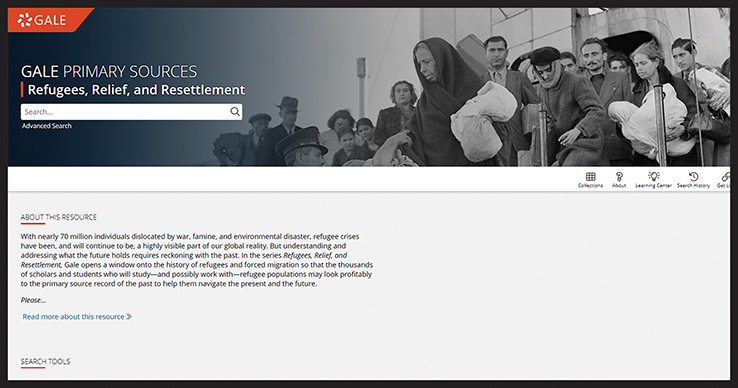Refugees, Relief, and Resettlement: The Early Cold War and Decolonization | eReview
Part two of Gale's Refugees, Relief, and Resettlement archive excels as a resource supporting research in history, political science, sociology, diaspora studies, and migration and refugee studies.
Refugees, Relief, and Resettlement: The Early Cold War and Decolonization
CONTENT The second in Gale’s two-part Refugees, Relief, and Resettlement archive, “The Early Cold War and Decolonization,” adds a new layer to the history of displacement and forced migration from the start of the Cold War to the decolonization of European colonial territories, and the rise of independence movements in Africa, Asia, and the Middle East. The collection covers civil wars, mass migrations, uprisings, and other conflicts, such as the Hungarian Revolution of 1956, the Prague Spring of 1968, the Korean War, and the wars in Southeast Asia.
The archive contains roughly 400,000 pages of content sourced from the UK National Archives, the New York City Bar Association Library, and Rutgers University. These include refugee records from the General Correspondence Files of the Political Departments of the Foreign Office (1947–79), the Foreign Office (1947–67), and Offices of the United Kingdom (1947–70); briefs filed with the United States Court of Appeals on Refugees and Asylum (1954–80); and materials from the American Council of Voluntary Agencies for Foreign Service Collection (1942–87). Due to the nature of the materials, personal identifiers may be redacted for the sake of privacy, particularly in regard to individual or familial details.
USABILITY Basic and advanced search tools allow users to search the entire archive or browse/search each of the five featured collections. Links to the About page, Learning Center, search history, and collection permalink are located at the top of the homepage. With the advanced search tool, users can conduct multiple search queries and filter by publication date, archive, refugee population, place of departure or destination, current location, collection title, document type, illustrated works, and source library. Search results can be filtered with the same parameters.
Materials in the collection are available as text-searchable, hi-res scans of the original document. Users can search within documents and have the option to sort through a list of results based on keyword previews. OCR-based text is available for documents, but the transcripts are not always accurate.
Specialized indexing fields allow researchers to engage in targeted research. These include terms that reflect the needs of researchers, such as ethnicities, nationalities, religious groups, and geographic locations, including point of origin, present-day locations, and recorded destination. The Learning Center features sample searches and topics that shed light on creating effective research strategies. Additional tools include a Topic Finder and Term Frequency visualizer, citation tools, and options for sharing, downloading, and printing.
PRICING Pricing starts at $9,783 with a hosting fee that starts at $85 annually. Public library pricing is based on population served. Academic library pricing is based on full-time enrollment and other institutional variables. Institutions holding two or more Gale Primary Source collections receive complimentary access to the Gale Primary Sources cross-search platform. Potential customers should contact their Gale representative for current pricing and consortial purchase information. Free trials are available upon request.
VERDICT This excellent resource has particular appeal for institutions supporting research in history, political science, sociology, diaspora studies, and migration and refugee studies. The collection is easy to navigate, and the specialized indexing fields provide an additional layer of control for advanced research.
Add Comment :-
RELATED
ALREADY A SUBSCRIBER? LOG IN
We are currently offering this content for free. Sign up now to activate your personal profile, where you can save articles for future viewing









